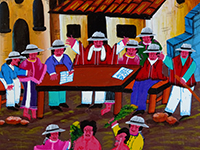Rural societies in Peru and Ecuador have developed their own customary law and informal judicial systems based on their indigenous culture. They maintained their traditional conflict resolution systems both for reasons of cultural identity and because of the inability of the state to protect them against criminal offenders. Indigenous justice enjoys a positive reputation among village dwellers, especially because of its peacemaking function. On the one hand, indigenous justice generally reeducates, rehabilitates and reintegrates offenders back into their communities. On the other hand, critics of State Attorneys and Judges note that such indigenous legal practices do not always respect human rights. This study examines the factors that influence the change of customary law and the indigenous judicial systems. The result is a portrait of indigenous cultures caught between “tradition” and “modernity”.
Hans-Jürgen Brandt examined the evolution of parallel legal and judicial systems over 30 years in Peru and over 15 years in Ecuador. He analyzed 1.100 cases of conflict and interviewed about 350 people. His findings are now published in the series „Studien der Hessischen Stiftung Friedens- und Konfliktforschung“:
Hans-Jürgen Brandt: Indigene Justiz im Konflikt, Konfliktlösungssysteme, Rechtspluralismus und Normenwandel in Peru und Ecuador, Studien der Hessischen Stiftung Friedens- und Konfliktforschung, Band 33, Baden-Baden: Nomos, 2016.
The book (in German) is available at Nomos-Verlag.
